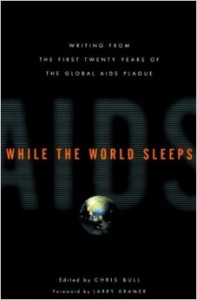 While the World Sleeps: Writing from the First
While the World Sleeps: Writing from the First
Twenty Years of the Global AIDS Plague.
Edited by Chris Bull
Thunder’s Mouth Press. 421 pages, $16.95
WHILE the World Sleeps is a collection of previously published essays about AIDS from established writers as well as from individuals living with the disease. The range of essays that Chris Bull has assembled underscores the myriad cultural responses that the disease has generated over the last twenty years.
Larry Kramer, who suggested the title and is referred to in one essay as “the Paul Revere of AIDS journalism,” has contributed a foreword. His notorious anger is present in this brief piece, as is his penchant for excoriating the powers-that-be—and those that were—for their lack of action in a time of crisis. Kramer produces a list of notable individuals who have not, he claims, “written one word about [the]plague,” citing Norman Mailer, Philip Roth, Joyce Carol Oates, and Salman Rushdie, among others. He includes Michael Jackson on this list, evidently unaware that Jackson’s 1991 album Dangerous contained a tribute to Ryan White in a song called “Gone Too Soon.”
The text is divided into four chronological sections. The first and briefest, “Origins,” describes the ominous appearance of a “gay cancer” in the early 1980’s. The second, “Response and Backlash,” examines the culture of AIDS from the mid 80’s to the early 90’s, including well-known works from Susan Sontag and Andrew Holleran. The third section, “Coming to Terms,” chronicles how authors such as Abraham Verghese, Marlon Riggs, and David Feinberg confronted the realities of AIDS. The concluding section, “Going Global,” places the epidemic in a larger context, showing how the disease is (or is not) managed in India, Brazil, the former Soviet Union, and parts of Africa. Throughout the text, Bull does an admirable job of representing AIDS with respect to race, gender, and sexual orientation. Nonetheless, the book might have been better served if he had integrated the “Going Global” section into the previous one. “Going Global” implies that the spread of AIDS beyond American or Western borders is a recent development, which is certainly not the case.
Reading While the World Sleeps, the reader is struck by the sheer breadth of writing that has been produced about a disease that’s only twenty years old. The book takes us back to the days when the hope for treatment was placed in interferon and plasmapheresis, and also to the days when AIDS activism was in full swing, before the complacency of contemporary discourse had set in. In “Whatever Happened to AIDS?” Jeffrey Schmalz comments on this state of affairs: “Once AIDS was a hot topic in America—promising treatments on the horizon, intense media interest, a political battlefield. Now [it]has become normalized, part of the landscape. It is at once everywhere and nowhere.”
Kramer’s gaffe about Michael Jackson is far from the only inaccuracy to appear in While the World Sleeps. For instance, Bull asserts in his introduction that the initial appellation for AIDS was “Gay Related Immunity Disorder” (or GRID), while in fact the last two letters stood for “immuno-deficiency”; and he characterizes AIDS as solely a sexually transmitted disease. He lists the publication date of Paul Monette’s memoir Borrowed Time as 1998, eleven years after its actual publication. In addition to such errors of fact, parts of While the World Sleeps are riddled with inconsistencies. For example, Bull touts the importance of the alternative press in disseminating information about AIDS, but the book opens with an excerpt from the New York Times and ends with a piece from the Wall Street Journal.
While the World Sleeps is best read from a sociopolitical standpoint. For example, it is instructive to contrast the speeches about AIDS delivered by Bob Hattoy and Mary Fisher at, respectively, the Democratic and Republican National Conventions in 1992, noting how Hattoy is frequently interrupted by applause and ovation, while Fisher is allowed to read her remarks in stony silence. The range of materials in this volume is especially valuable for revealing the numerous and conflicting responses that AIDS has generated.





